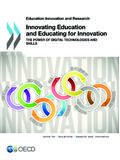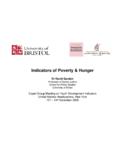Transcription of THE NATIONAL TEACHER EDUCATION CURRICULUM …
1 THE NATIONAL TEACHER EDUCATION CURRICULUM FRAMEWORKTHE ESSENTIAL ELEMENTS OF INITIAL TEACHER EDUCATIONM inistry of EducationREPUBLIC OF GHANATHE ESSENTIAL ELEMENTS OF INITIAL TEACHER EDUCATION2 ForewordThe performance of the EDUCATION system and its impact on children s learning outcomes has been one of the critical issues of concern to Ghanaian citizens. The objective of the Ministry of EDUCATION is to improve the learning outcomes of all learners in our schools through the implementation of appropriate policy measures. This objective necessitates improving the quality of the teaching force through initial continuing TEACHER NATIONAL TEACHER EDUCATION CURRICULUM Framework, developed through stakeholder consultations, is the central vehicle for the transformation of Initial TEACHER EDUCATION in Ghana.
2 The CURRICULUM Framework has been developed on the premise that a critical step to achieving the quality of EDUCATION for all is to train increased numbers of effective, engaging and inspirational teachers. Through this, the Framework will provide support for addressing the on-going and systemic problem of underachievement of Ghanaian children. The strength of this framework is that, it: specifies the essential elements of what an initial TEACHER EDUCATION programme requires to train the teachers needed to deliver inclusive, equitable and high-quality EDUCATION for all; is driven by the NATIONAL Teachers Standards as the determiner of who a good TEACHER is; and will support system change in TEACHER EDUCATION and ultimately in EDUCATION in Ghana to secure every child s right to teachers who are able to support learning and Framework provides the benchmark against which all TEACHER EDUCATION Curricula in Ghana will be reviewed and revised.
3 It will allow flexibility and diversity among different TEACHER training institutions while ensuring consistency and quality in TEACHER EDUCATION CURRICULUM through compliance with the defined elements of the the Framework is essential to the transformation of TEACHER EDUCATION , the Government is mindful that a number of attendant policy issues will also have to be addressed in order to ensure its a policy document, all stakeholders involved in initial TEACHER EDUCATION must ensure that the NATIONAL TEACHER EDUCATION CURRICULUM Framework is employed effectively as the vehicle to transform TEACHER EDUCATION and to bring about improved learning outcomes in our EDUCATION Dr. Matthew Opoku Prempeh Minister for EDUCATION THE NATIONAL TEACHER EDUCATION CURRICULUM FRAMEWORK 3 Acknowledgement The development of the NATIONAL TEACHER EDUCATION CURRICULUM Framework (NTECF) was under the guidance of the NATIONAL Council for Tertiary EDUCATION (NCTE) and the NATIONAL Teaching Council (NTC), and draws on the expertise of Ghanaian CURRICULUM and EDUCATION experts who worked over many months, drawing on international best practices.
4 The process was interactive and engaged NATIONAL stakeholders in a series of consultations across the country to draw on both the experiences and aspirations of EDUCATION stakeholders. The process was supported through the institutional development component of the Transforming TEACHER EDUCATION and Learning (T-TEL) project as part of the process of transformation of Colleges of EDUCATION (CoE) in Ghana into tertiary institutions. Professor Jophus Anamuah-Mensah, the key adviser to T-TEL Institutional Development, spearheaded the technical team supported by Bea Noble Rogers and Dr. Eric Daniel development of the NATIONAL TEACHER EDUCATION CURRICULUM Framework (NTECF) was done in phases. Each phase drew directly and explicitly on the earlier phase and on the expertise of NATIONAL strategic stakeholders/partners in TEACHER EDUCATION and EDUCATION more widely, as well as the participation of significant individuals and groups for contributions toand consultation over the developing framework.
5 We cherish the constructive inputs from key stakeholders such as Principals and Tutors of Colleges of EDUCATION , Vice Chancellors of TEACHER EDUCATION Universities, Parliamentary Select Committee on EDUCATION , Regional and District Directors of EDUCATION , TEACHER Unions, NGOs, and Civil Society who helped to shape the framework. The team is grateful for the invaluable inputs from Akwasi Addae-Boahene the NATIONAL Programme Manager of T-TEL, who has been very supportive and has shown extraordinary commitment to the development of the NATIONAL TEACHER EDUCATION CURRICULUM Framework. We cannot leave out all the staff and management of T-TEL who have been the backbone during the entire process. Finally, the team is very appreciative of the technical team who authored, responded to the consultation and showed commitment in the development of the NATIONAL CURRICULUM of the NATIONAL Technical Committee on TEACHER EDUCATION CURRICULUM ReviewName PositionProf.
6 Mohammed SalifuExecutive Secretary, NATIONAL Council for Tertiary EDUCATION and Chairman of the Committee Akwasi Addae-BoaheneChief Technical Adviser, Transforming TEACHER EDUCATION and Learning in Ghana ProgrammeProf. Jophus Anamuah-MensahKey Adviser, Institutional Development, Transforming TEACHER EDUCATION and Learning in Ghana ProgrammeBeatrice Noble-RogersConsultant, Transforming TEACHER EDUCATION and Learning in Ghana ProgrammeProf. Ernest DavisDeputy Director, Institute of EDUCATION , University of Cape CoastProf. Frederick OcanseyDirector, Institute of EDUCATION , University of Cape CoastDr. Charles Owu-EwieDean, Faculty of Ghanaian Language EDUCATION , University of EDUCATION , WinnebaProf. Damian Kofi MerekuAssociate Professor in Mathematics EDUCATION , University of EDUCATION , WinnebaDr.
7 Agatha InkoomHead, Department of Basic EDUCATION , University of Development StudiesRev. Sister Elizabeth Amoako-ArhenPresident, NATIONAL Conference of Principals of Colleges of EducationTHE ESSENTIAL ELEMENTS OF INITIAL TEACHER EDUCATION4 Baako John Naporo MahamaFormer Principal, Peki College of EducationDr. Augustine TawiahFormer Executive Secretary, NATIONAL Teaching Council Dr. Johnson OdharoDeputy Chief of Party, USAID Learning ProjectFelicia Boakye-YiadomActing Director, NATIONAL Council for CURRICULUM and AssessmentCynthia Bosomtwi-SamActing Executive Secretary, NATIONAL Inspectorate BoardDr. Evelyn OduroActing Executive Secretary, NATIONAL Teaching CouncilKenji OharaDeputy Team Leader, Pre-Tertiary TEACHER Professional Development and Management projectProf. Paul BuatsiConsultant, TEACHER EDUCATION Division Pre-Tertiary TEACHER Professional Development and Management projectRichard AdjeiFormer Deputy Executive Secretary, NATIONAL Accreditation BoardMary Afua AckummeyTeaching and Learning Adviser, Transforming TEACHER EDUCATION and Learning in Ghana ProgrammeDr.
8 Eric Daniel AnangaSupport to Key Adviser, Institutional Development, Transforming TEACHER EDUCATION and Learning in Ghana ProgrammeCharles Aheto-TsegahFormer Executive Secretary, NATIONAL Council for CURRICULUM and Assessment Mr. Simon Tsadidey Executive Secretary, NATIONAL Conference of Principals of Colleges of EDUCATION SecretariatColette HukpatiHead of Accreditation Department, NATIONAL Accreditation Board THE NATIONAL TEACHER EDUCATION CURRICULUM FRAMEWORK 5 Table of ContentsForeword2 Acknowledgement3 Summary: Introduction, rationalisation and overview of the CURRICULUM Framework71. Rationale for the CURRICULUM Framework72. Creating the Framework73. Framework at a glance: the keys to success in TEACHER education84. Policy issues emerging through the Framework9 Chapter 1: Background, policy context, concerns and vision for TEACHER education10 Challenges of the school system that inform TEACHER education11 Concerns with initial TEACHER EDUCATION Curriculum12 Ghana s TEACHER EDUCATION philosophy14 Chapter 2: Overview of the CURRICULUM Framework15 The Framework17 Chapter 3: The four pillars of the CURRICULUM framework19 Pillar 1: Subject and CURRICULUM knowledge 20 Expectations of Subject and CURRICULUM knowledge20 Subject and CURRICULUM knowledge21 Subject content knowledge21 CURRICULUM studies22 Assessment of Pupils learning22 Pillar 2: Literacy studies.
9 Ghanaian languages and English23 Expectations of student teachers23 Literacy studies24 Language proficiency and communication component (L1/L2)24 Early grade literacy (KG-P3)26 Pillar 3: Pedagogic knowledge27 General pedagogical knowledge28 CURRICULUM provision28 Pedagogical content knowledge30 CURRICULUM provision30 EDUCATION studies31 Pillar 4: Supported teaching in school32 Expectations from student teachers32 Initial TEACHER EDUCATION Institutions Requirements for School partnership and reflective practice33 Assessment and valuation of students34 Establishing demonstration/partner schools36 THE ESSENTIAL ELEMENTS OF INITIAL TEACHER EDUCATION6 Chapter 4: Cross-Cutting Issues37 Professional values and attitudes37 Expectations39 Equity and Inclusivity41 How to achieve equity and inclusivity in classrooms41 General strategies or processes43 Implications for tutors/lecturers and leaders43 Assessment strategies43 Assessing pupils progress and learning43 NATIONAL Teachers Standards Expectations on student teachers44 Essential themes, Issues and Content44 Core and transferable skills45 Expectations from Student teachers45 Links with other aspects of the Framework46 Other issues47 Continuing Professional Development (CPD)
10 47 Audience for and providers of CPD47 Expectations of CPD47 Requirements for CPD48 Assessing Student teachers49 Expectations49 Further issues50 Specialism in TEACHER education50 Intended impact on students51 Weightings of the CURRICULUM Framework51 Policy implications of the CURRICULUM Framework52 Chapter 5: Complementary areas of the CURRICULUM Work54 EDUCATION of teachers for technical and vocational education54 Expectations54 TEACHER educators in TEACHER education57 ICT in TEACHER ducation ramwork59 Using ICT to promote learning in TEACHER education60 Other technologies in TEACHER education62 Concluding statement64 Documents consulted66 Appendix 168 Glossary69 THE NATIONAL TEACHER EDUCATION CURRICULUM FRAMEWORK 71 Pre-service TEACHER EDUCATION is synonymous with initial TEACHER training (ITE) 2 The framework covers all the pre-service programmes in the countrySummary: introduction, rationalisation and overview of the CURRICULUM Framework1.





